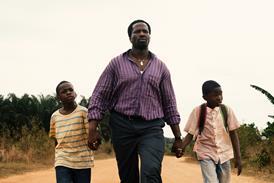The name Canana, which translates as "cartridge belt", has an almost revolutionary ring to it. That fits with the goals of the Mexican production house's founders Diego Luna, Gael Garcia Bernal and Pablo Cruz. "We want productions that give the world an insight into our reality," says Cruz, who runs the company. "We were worried about (Mexico's) situation, and fed up with the cliched vision of our country as a violent, impoverished place," adds Canana's head of development, Kyzza Terrazas. "We wanted to show something else."
Now celebrating its first anniversary with four features in the can - including Bernal and Luna's directorial debuts - and two more in pre-production, the Mexico City-based Canana, which has a first-look deal with Focus Features in the US, can look back on a "mad ride", according to Cruz, and a busy future.
"Focus was interested in Latin-American talent, so we set up Canana as a hub for Latin-American production. Our goal is to make projects that try to show, with honesty and through new talent, the values of Latin America without falling into stereotypes," says Cruz. "We want to develop films and programmes with local talent that have an international appeal."
So far, these include: Cochochi, a movie about Mexico's Raramuri Indians, with dialogue in their native language; Chavez, a documentary about Mexican boxer Julio Cesar Chavez, directed by Diego Luna; and Deficit, directed by Gael Garcia Bernal, which looks at how two different social classes interact at a family gathering in Mexico. Gerardo Naranjo's DramaMex, which played at Critics' Week in Cannes last year, will open in Mexico on March 1. The two projects in pre-production are Naranjo's Voy A Explotar and 18 Cigarrillos Y Medio, a film set in Paraguay by first-time director Marcelo Tolces.
A meeting of minds
The seeds for Canana go back to when Bernal and Cruz first met in London more than a decade ago. Bernal was studying at the Central School of Speech and Drama and Cruz was running his own production company. "We were both broke and hungry and started to talk about joint future projects, stories that never went anywhere. However, we moved on and took different roads," says Cruz.
Eventually their paths crossed again. "After Y Tu Mama Tambien (in which Bernal and Luna, friends since they were children, co-starred), I was really looking forward to starting up a company like this, a place where all our ideas could converge and become reality," explains Bernal. "So I introduced Pablo to Kyzza and Diego."
Canana currently employs 12 people, most of them under 30, with offices in the hip Condesa neighbourhood of Mexico City. According to Luna: "Although Canana is still only a young company, it already represents an extremely interesting alternative for Mexican directors. In our country, the projects which receive financial backing are those which try to imitate American formats, projects which are guaranteed to be a universal hit. Canana gives directors the freedom to make their own films, and does not try to intervene in the creative process."
Dynamism on a budget
Half the population of Mexico lives below the poverty line (the minimum wage is $5 per day) but film industry costs are still high and average budgets for local productions run from $1.5 to $2.3m. Still, Canana is a conservative producer. "We want to minimise the risk of not recouping. So far all our budgets have been under $1m," says Cruz.
Apart from the films, Canana has also developed a TV series and started its own travelling festival last year. Called Ambulante, it is Mexico's first travelling documentary film festival, and is currently underway again, running February 2 to March 29. "Even if, particularly in recent times, the production of documentaries has been quite big in our country, such productions are viewed by only a very small audience. So, our goal is to bring documentary films from all over the world to places where they are rarely seen," says Elena Fortes, the festival's director.
Canana's policy is clear: "We are not about aiming for a specific number of films a year. What we want is to produce the films that are important to make," says Cruz. "For example, last year we made Cochochi - we read the script and fell in love with it. We had to make it possible to produce a film in a Mexican native language with only local actors."
So far, Canana has financed its projects through private equity and by setting up strong ties with sales companies and international distributors. "We have an excellent relationship with Focus, and we are now developing some material. Indeed, we may be doing our first film together soon. But we have a first-look deal so we don't have automatic sales rights on our films," says Cruz.
This year, when the films are shown for the first time, the public gets the chance to have its say. "Whatever the verdict," concludes Garcia Bernal, "simply the fact that we have made these films can be seen as a major success."

















No comments yet